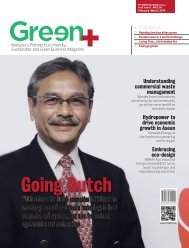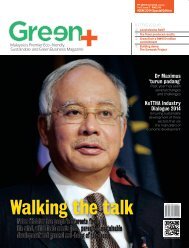Green+ Malaysia's Premier Eco-friendly, Sustainable and Green Business Magazine
SIRIM - Technology Provider
SIRIM - Technology Provider
Create successful ePaper yourself
Turn your PDF publications into a flip-book with our unique Google optimized e-Paper software.
ENVIRONMENT<br />
stronger enforcement in the future,”<br />
added Palanivel.<br />
In 2013, there were 275 (58%) rivers<br />
classified as clean, 173 (36%) slightly<br />
polluted <strong>and</strong> 29 (6%) as polluted based<br />
on river Water Quality Index. The<br />
percentage of clean rivers has slightly<br />
decreased by 0.6% compared to previous<br />
year. The same trend also has been<br />
recorded in the number of polluted<br />
rivers which has decreased by 1.9%.<br />
ENHANCING MARINE<br />
WATER QUALITY<br />
The Minister said Malaysia implemented<br />
various strategies in order to enhance<br />
the marine water quality status for<br />
beneficial uses in particular to recreation,<br />
fishing <strong>and</strong> marine parks. Efforts<br />
undertaken by the Department of<br />
Environment Malaysia (DOE) to curb the<br />
pollution namely from shipping activities,<br />
oil <strong>and</strong> gas exploration, marine<br />
installation <strong>and</strong> ports activities include:<br />
i. Enforcement via Environmental<br />
Quality Act, 1974 <strong>and</strong> Exclusive<br />
<strong>Eco</strong>nomic Zone Act, 1984 to ensure<br />
effective control of sources of marine<br />
pollution <strong>and</strong> illegal discharges;<br />
ii. Implementation of National Marine<br />
Water Quality Monitoring program<br />
that consists of 321 monitoring<br />
stations that was established at<br />
estuaries (76), isl<strong>and</strong>s (90) <strong>and</strong><br />
coastal areas (155). Based on the<br />
marine water quality monitoring<br />
data in 2013, 30 stations were<br />
categorized as poor, 229 stations<br />
categorized as moderate, 56 stations<br />
categorized as good <strong>and</strong> 6 stations<br />
were categorized as excellent.<br />
iii. Established the sustainable development<br />
through conservation of<br />
resources via Environmental Impact<br />
Assessment (EIA);<br />
iv. Promotion of environmental education<br />
<strong>and</strong> awareness through forums,<br />
joint programs <strong>and</strong> seminars such<br />
as National Oil Spill Combat Exercise<br />
that engaged other relevant government<br />
agencies, port <strong>and</strong> platform<br />
operators as well as industries;<br />
v. Inter-Agency <strong>and</strong> Federal-State<br />
Cooperation via joint enforcement;<br />
vi. Strengthening the bilateral, regional<br />
<strong>and</strong> international cooperation<br />
between littoral states <strong>and</strong> ASEAN<br />
countries; <strong>and</strong><br />
vii. Implementation of National Oil Spill<br />
Combat Plan (NOSCP) during oil spill<br />
incidence in Malaysian waters.<br />
ENHANCING AIR QUALITY<br />
As an enforcement agency, the DOE<br />
had been enforcing the Environmental<br />
Quality Act 1974, to control emissions<br />
from various sources such as industries<br />
National Park,<br />
Pahang.<br />
<strong>and</strong> motor vehicles with the view that<br />
Malaysians will enjoy a cleaner, safer<br />
environment <strong>and</strong> at the same time have<br />
a better quality of life.<br />
“In addition, the Clean Air Action<br />
Plan (CAAP) was drawn up in line<br />
with the ‘7th <strong>Green</strong> Strategy’ in the<br />
National Policy on the Environment.<br />
The CAAP presents a set of strategies<br />
<strong>and</strong> indicators that together provide a<br />
roadmap to achieve better air quality<br />
by reducing the frequency, severity <strong>and</strong><br />
duration of poor air quality episodes,”<br />
said Palanivel.<br />
Referring to the recent transboundary<br />
haze, Palanivel said Malaysia has<br />
urged Indonesia to immediately extinguish<br />
l<strong>and</strong> <strong>and</strong> forest fires in Sumatra<br />
that are causing the haze in the country.<br />
The urge was extended to Indonesia in a<br />
letter by Department of Environment’s<br />
Director-General to her Indonesian<br />
counterpart recently. The letter<br />
expressed Malaysia’s concern with the<br />
We may not guarantee that<br />
the haze will not return, but<br />
Malaysia is hopeful that nations<br />
affected by the haze would<br />
be able to find a joint solution<br />
in the spirit of ASEAN <strong>and</strong><br />
continuously take preventive<br />
measures to prevent l<strong>and</strong> <strong>and</strong><br />
forest fires <strong>and</strong> the recurrence of<br />
transboundary haze.<br />
increase of hotspots which cause haze<br />
intermittently in the country since June<br />
2014. The southwest monsoon played<br />
a major role in bringing the haze to<br />
Malaysia <strong>and</strong> this was expected to continue<br />
until middle of September 2014.<br />
“As transboundary haze pollution<br />
remained a major <strong>and</strong> persistent challenge<br />
to ASEAN region, we must not<br />
quit from finding concrete solutions <strong>and</strong><br />
retain our momentum in tackling this<br />
perennial problem. ASEAN member<br />
nations must acutely implement the<br />
action plan at ground for the initiative<br />
to witness tangible outcomes.<br />
“We may not guarantee that the<br />
haze will not return, but Malaysia<br />
is hopeful that nations affected by<br />
the haze would be able to find a joint<br />
solution in the spirit of ASEAN <strong>and</strong><br />
continuously take preventive measures<br />
to prevent l<strong>and</strong> <strong>and</strong> forest fires <strong>and</strong> the<br />
recurrence of transboundary haze,”<br />
said Palanivel<br />
At national level, Malaysia will continue<br />
to take all necessary mitigating<br />
measures to prevent haze resulting<br />
from local sources such as open burning,<br />
emissions from motor vehicles <strong>and</strong><br />
industries <strong>and</strong> earth works activities.<br />
Malaysia has also prepared a plan of<br />
actions to face with a likelihood of<br />
El Nino developing in the second half<br />
of 2014. The plan of actions includes:<br />
multi-agency intervention in curbing<br />
open burning <strong>and</strong> l<strong>and</strong> <strong>and</strong> forest fires;<br />
intensifying law enforcement against<br />
offenders; <strong>and</strong> strengthening our<br />
national preparedness <strong>and</strong> firefighting<br />
capabilities.<br />
“In addition, we had reviewed our<br />
National Haze Action Plan <strong>and</strong> the<br />
14<br />
november-december, green+.2014





